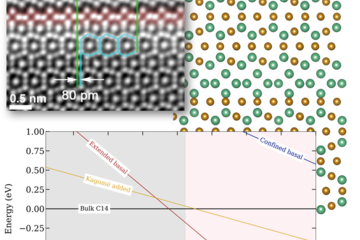All genres
241.
Talk
Coupling of magnetic and lattice degrees of freedom in bulk materials. Magnetism Workshop, Fagerudd, Sweden (2015)
242.
Talk
Scale hoping simulations and real atoms. ICAMS Workshop ‘From Atoms to Continuum’,ICAMS, Ruhr University Bochum, Bochum, Germany (2015)
243.
Talk
Chemo-mechanical coupling: Ab initio concepts for Fe-based alloys. SPP1713 spring school, Maria Laach, Germany (2015)
244.
Talk
Coupling of magnetic and lattice degrees of freedom in metals. Magnetism Minisymposium, Uppsala, Sweden (2015)
245.
Talk
The Itinerant Coherent Potential Approximation for phonons: role of fluctuations for systems with magnetic and chemical disorder. Materials Theory Group, Oak Ridge National Laboratory, Oak Ridge, TN, USA (2015)
246.
Talk
Adaptive C content in coherently strained kappa-carbides - An ab-initio explanation of atom probe tomography data. TMS 2015, Orlando, FL, USA (2015)
247.
Talk
Random phase approximation up to the melting point: Impact of anharmonicity and nonlocal many-body effects on the thermodynamics of Au. DPG Spring Meeting 2015, Berlin, Germany (2015)
248.
Talk
Thermodynamic phase stability in the Al–Sc system using first principles methods. 79th Annual Meeting of the DPG, DPG-Frühjahrstagung 2015, Technische Universität Berlin, Berlin, Germany (2015)
249.
Talk
Ab initio description of the Ti bcc to omega transition at finite temperatures. DPG-Frühjahrstagung 2015, Berlin, Germany (2015)
250.
Talk
Magnon-Phonon-Coupling in Fe. ICAMS Retreat 2015 , Soest, Germany (2015)
251.
Talk
Multiscale modelling of hydrogen embrittlement in metals. DPG Spring Meeting, Berlin, Germany (2015)
252.
Talk
Thermodynamics of the Q phase in Al–Mg–Cu–Si. ICAMS Scientific Retreat, Soest, Germany (2015)
253.
Talk
Adaptive C content in coherently strained kappa-carbides - An ab initio explanation of atom probe tomography data. 2nd German-Austrian Workshop on "Computational Materials Science on Complex Energy Landscapes", Kirchdorf, Austria (2015)
254.
Talk
The itinerant coherent potential approximation for phonons: Role of fluctuations for systems with magnetic disorder. 2nd German-Austrian Workshop, Kirchdorf, Austria (2015)
255.
Talk
Thermodynamic phase stability in the Al–Sc system using first principles methods. 2nd German-Austrian Workshop on "Computational Materials Science on Complex Energy Landscapes", Kirchdorf, Austria (2015)
256.
Talk
Ab initio insights into the interaction of hydrogen with precipitates in steels. Workshop on Hydrogen Embrittlement and Sour Gas Corrosion 2015, Düsseldorf, Germany (2015)
257.
Talk
Ab initio description of the Ti bcc to omega transition at finite temperatures. PTM 2015, International Conference on Solid-Solid Phase Transformations in Inorganic Materials, Whistler, BC, Canada (2015)
258.
Talk
Temperature dependent magnon-phonon coupling. 2nd German-Austrian Workshop, Kirchdorf, Austria (2015)
259.
Talk
First-principles study of thermodynamic properties of the Q phase in Al–Cu–Mg–Si. Calphad XLIV, Loano, Italy (2015)
260.
Talk
First-principles study of thermodynamic properties of the Q-phase in Al–Cu–Mg–Si. 2nd German-Austrian Workshop, Kirchdorf, Austria (2015)










